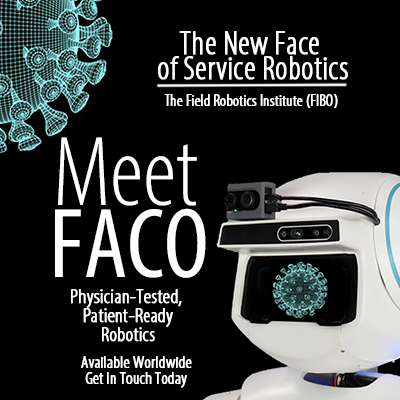
COVID returns to Thailand
Thailand, COVID and Its Healthcare Service Robots
Displaying world-class leadership in 5G, AI/ML, sensors and computing, FIBO is quite the rising force in healthcare robotics; it’s got a robot for nearly every healthcare need

The Geek+ of healthcare robotics
With Thailand’s 1,000+ hospitals, over 450 in Bangkok alone, with a healthcare system ranking as one of the top systems worldwide (CEO World), and with 2.5 million medical tourists heading to Thailand annually, the future of healthcare service robots should be very bright.
Sadly, uptake has been glacial…until COVID. Just like everywhere else in the world, COVID jumped healthcare service robots onto every country’s radar and on every hospital and clinic’s must-have-now list.
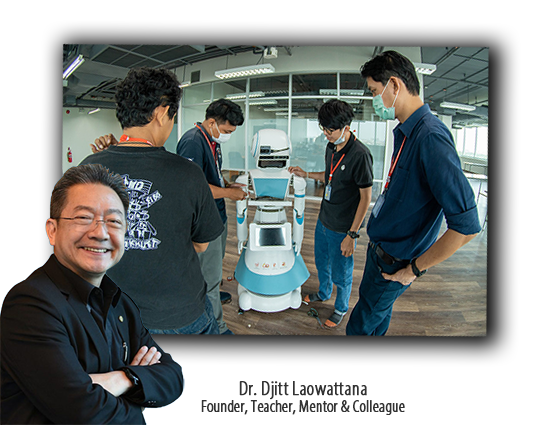 COVID put the world on notice that healthcare service robots were suddenly a necessity for now and into the future. Some virus or another is not going to leave humanity free of future threats from pandemics, especially now with global warming uncovering unsavory, million-year-old dinosaur viruses as ice packs recede.
COVID put the world on notice that healthcare service robots were suddenly a necessity for now and into the future. Some virus or another is not going to leave humanity free of future threats from pandemics, especially now with global warming uncovering unsavory, million-year-old dinosaur viruses as ice packs recede.
Few vendors are ready for total war with viruses. There are a few developers with excellent healthcare service machines, but none as flush with healthcare tech as Dr. Djitt Laowattana’s FIBO, Thailand’s Field Institute of Robotics.
More than two decades in existence, Thailand’s premier robotics institute is part R&D facility and robot builder. FIBO is the Geek+ of healthcare service robots; it’s got a robot for nearly every healthcare need. Displaying world-class leadership in 5G, AI/ML, sensors and computing, FIBO is quite the rising force in healthcare robotics. We did an article on FIBO’s FACO robot during the height of the pandemic in 2020: Service Robots Head to Pandemic’s Frontlines. Maybe one future addition to Dr. Laowattana’s robot fleet could well be a service robot with a versatile arm, like Moxi from Diligent Robotics.
Here to offer an update on FIBO’s recent activities is Prof. Supachai Vongbunyong, PhD, Head & Founder of Hospital Automation Research Center at FIBO (HAC@FIBO)
by Dr.Supachai Vongbunyong:
It cannot be denied that COVID-19 pandemic situation has changed the world dramatically. Since 2020, a lot of robotic technology has been developed during this hard time in Thailand and all around the world to support health workers in various activities related to patients’ service.
In 2020, Project “FACO” (FIBO Against COVID-19) of “Mod Boriraksa” (name bestowed by Her Royal Highness Princess Maha Chakri Sirindhorn) was initiated by Assoc. Prof. Djitt Laowattana, PhD, the founder and advisor of Institute of Field Robotics, King Mongkut’s University of Technology Thonburi.
The primary goal is to reduce the risk of infection by offering physical distance between health workers and patients. FACO initially consists of 3 types of robots which are SOFA, CARVER, and a service robot. First, ”SOFA” is a service mobile robot with tele-medicine capability. It is equipped with a number of equipment, such as thermal camera and 20X high definition camera, that help the physicians in remote diagnosis.
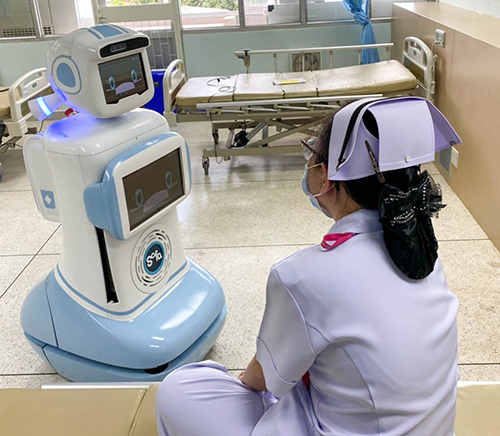
Second, “CARVER” is an autonomous mobile robot with built-in cabinet for transporting food and medicine for patients. CARVER has 20 secured storage slots where the patients are able to self-identify and obtain the food and medicine safely. Third, “Service robot” is a fast and small robot for serving small items as a helper of nurses. In addition, a new type of robot, MUM II is joining FACO sets to provide additional features, i.e. UV disinfection and bulk storage. At the end of 2020, FACO were installed in 3 hospitals in Bangkok and more than 10 other hospitals and EEC (Eastern Economic Corridor) area.
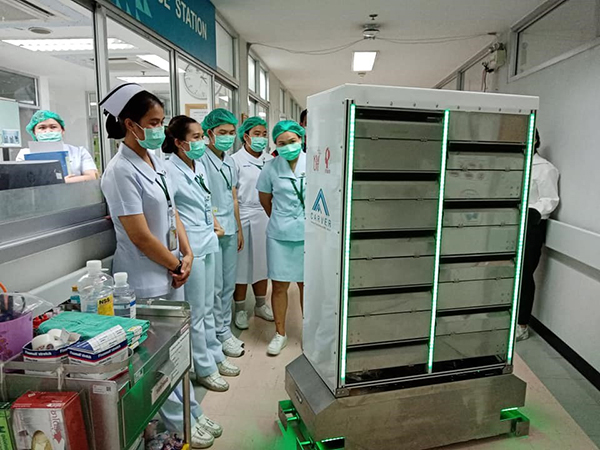
The FIBO Fleet in Action
(in Thai but easily followed)
This year, 2021, the pandemic situation in Thailand has been continued terribly. The number of COVID-19 patients has exceeded the capacity of hospitals. Over 450 field hospitals have been established around Thailand. At the same time, FACO has been continuingly developed and improved to help in this situation.
“CARVER-mini” is a new robot in CARVER Series. It is developed under Hospital Automation Research Center (HAC@FIBO) which is a research center under Institute of Field Robotics focused on application of robotics, automation, and artificial intelligence in health industry. CARVER-mini is a small size tele-operated mobile robot, 60 kg payload and 0.5 m/s max speed, aiming for medicine serving for patients in cohort wards and field hospitals.
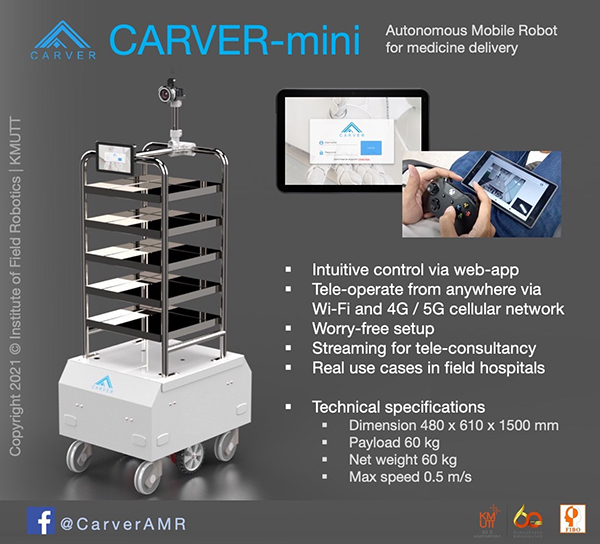
CARVER support tele-medicine by allowing the nurses and doctors to remotely navigate the robot and communicate with the patients through the web-app via CARVER cloud server. This robot is designed to be high quality yet affordable with the cost of US$ 4,000. Recently, 10 robots have been produced with the cooperation of private sectors and National Health Security Office in order to implement in various hospitals around Thailand.
This year, HAC@FIBO will take part in a many impactful projects in regard to implementation of robotics, automation, AI technologies in healthcare, health, and medical applications.
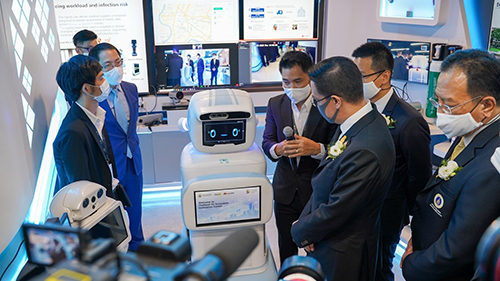
Recently, HAC, as a role of robotics and automation expert, is joining a national project for Digital Hospital, Thammasat University Hospital Pattaya, in EEC area. This hospital will become one of the most advanced digital hospitals in EEC and Thailand.

